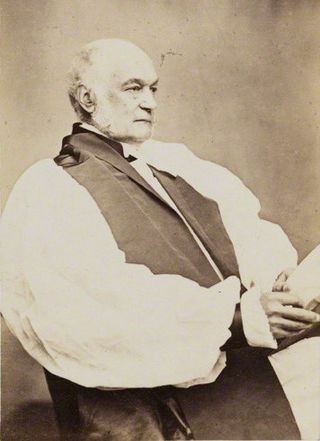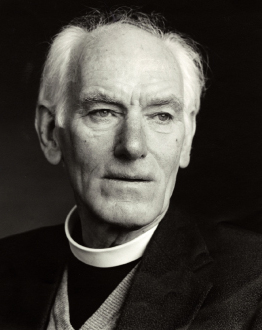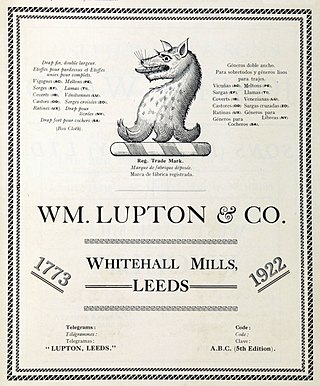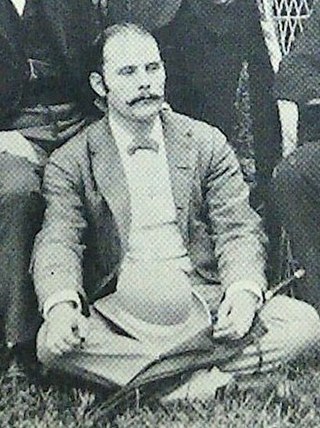
Sir Edward Nicholas Coventry Braddon was an Australian politician who served as Premier of Tasmania from 1894 to 1899, and was a Member of the First Australian Parliament in the House of Representatives. Braddon was a Tasmanian delegate to the Constitutional Conventions.

Lieutenant-General Sir Herbert Charles Chermside, was a British Army officer who served as Governor of Queensland from 1902 to 1904.

Rev. David Jayne Hill was an American academic, diplomat and author. He was president of Bucknell University and the University of Rochester.

George Moberly was an English cleric who was headmaster of Winchester College, and then served as Bishop of Salisbury from 1869 until his death.

The Church Commissioners is a body which administers the property assets of the Church of England. It was established in 1948 and combined the assets of Queen Anne's Bounty, a fund dating from 1704 for the relief of poor clergy, and of the Ecclesiastical Commissioners formed in 1836. The Church Commissioners are a registered charity regulated by the Charity Commission for England and Wales, and are liable for the payment of pensions to retired clergy whose pensions were accrued before 1998.

David George Hogarth, also known as D. G. Hogarth, was a British archaeologist and scholar associated with T. E. Lawrence and Arthur Evans. He was Keeper of the Ashmolean Museum, Oxford from 1909 to 1927.
Assistant Commissioner of Police of the Metropolis, usually just Assistant Commissioner (AC), is the third highest rank in London's Metropolitan Police, ranking below Deputy Commissioner and above Deputy Assistant Commissioner. There have usually been four officers in the rank; however, as of December 2023, there are seven owing to the appointment of a new portfolio, Trust and Legitimacy, and the continuing secondments of Rob Beckley to Operation Resolve, the criminal investigation into the Hillsborough Disaster, and Stephen Kavanagh to Interpol. There have also, at times, been five or six.

John McManners was a British clergyman and historian of religion who specialized in the history of the church and other aspects of religious life in 18th-century France. He was Regius Professor of Ecclesiastical History at the University of Oxford from 1972 to 1984. He also served as Fellow and Chaplain of All Souls College, Oxford, from 1964 to 2001.

Sir Maurice Bonham-Carter was an English Liberal politician. He was H. H. Asquith's Principal Private Secretary during Asquith's time as Prime Minister from 1910 to 1916 and later served in other government posts. He played cricket for Oxford University Cricket Club in the early 20th century. The actress Helena Bonham Carter is his granddaughter.

Edwin Cannan was a British economist and historian of economic thought. He taught at the London School of Economics from 1895 to 1926.

Sir Thomas Downing Kendrick was a British archaeologist and art historian.
James Lawrell was an English amateur cricketer who made 21 known appearances in first-class cricket matches from 1800 to 1810.
Captain Gerard Bruce Crole was a British colonial administrator, who represented Scotland in international rugby union and cricket, and was also a World War I flying ace credited with five aerial victories.
Sir Charles Arthur Roe was a British colonial administrator in India who was Chief Justice of the Lahore High Court between the years 1895 and 1898.
Sir Edward Vere Levinge (1867–1954) was an administrator in the Indian Civil Service who rose to serve as acting Lieutenant-Governor of the British Raj Province known as Bihar and Orissa. He held that office for the months of April–July 1918, being an interregnum in the office of Edward Albert Gait.

The Lupton family in Yorkshire achieved prominence in ecclesiastical and academic circles in England in the Tudor era through the fame of Roger Lupton, provost of Eton College and chaplain to Henry VII and Henry VIII. By the Georgian era, the family was established as merchants and ministers in Leeds. Described in the city's archives as "landed gentry, a political and business dynasty", they had become successful woollen cloth merchants and manufacturers who flourished during the Industrial Revolution and traded throughout northern Europe, the Americas and Australia.
Francis Lear was Dean of Salisbury in the Church of England from 1846 until his death.

Sir Edward John Cameron, KCMG was a British colonial administrator who served as governor of the Gambia from February 1914 to 1920.
John Leslie was an English first-class cricketer and British Army officer.
This page is based on this
Wikipedia article Text is available under the
CC BY-SA 4.0 license; additional terms may apply.
Images, videos and audio are available under their respective licenses.











